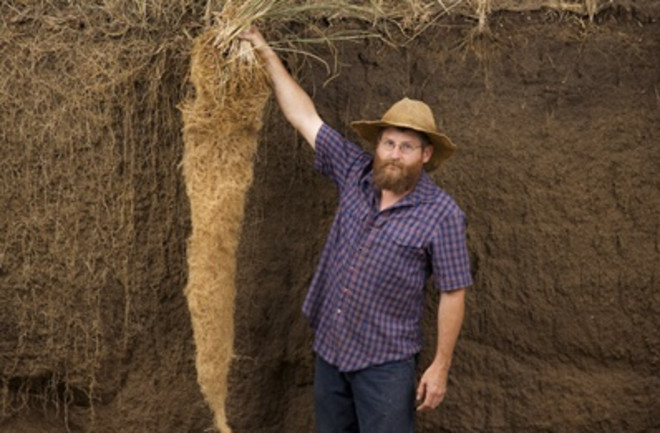Digging Deep: How to Feed the World With Perennial Food Crops - Hasan JasimA leading researcher dishes the dirt on potentially sustainable agric...
Published on by Water Network Research, Official research team of The Water Network

A leading researcher dishes the dirt on potentially sustainable agriculture for a growing global population
More than 9 billion people will live on Earth by 2050. They’ll need to eat somehow, but we’re already running out of arable land. And many types of agriculture — including conventional farming of annual crops, which need to be replanted each year — leave fields nutrient-poor, reducing future productivity.
Jerry Glover, a soil scientist, shows off a perennial wheatgrass plant’s long roots, which grow deeper than annual plants’ roots, improving soil structure and reducing erosion. Jim Richardson/National Geographic Creative
But soil scientist Jerry Glover is optimistic about feeding more people while conserving farmland soil. The solution, he believes, is to focus less on annual crops, which dominate world agriculture, and to embrace instead the potential of perennials, crops that can be harvested more than once without replanting.
Glover, a senior sustainable agricultural systems research adviser at the U.S. Agency for International Development (USAID), spent years as a researcher at the Land Institute in Kansas. There he realized the state’s perennial grasses might hold the secret to protecting soil, reducing fertilizer use and getting multiple harvests out of one plant.
Farming, Glover discovered, could have a neutral, even positive, impact on the agricultural ecosystem. In 2008, Nature named 48-year-old Glover one of five “crop researchers who could change the world.” Discover talked with Glover about his plan for doing just that.
Attached link
https://hasanjasim.online/digging-deep-how-to-feed-the-world-with-perennial-food-crops/?fbclid=IwAR11LecNwnRZCbkB4eFIkD8CmIZqL0GJQENF07cC7Nw6JGqy9xvhvyrvbpwTaxonomy
- Agriculture
- Sustainable Agriculture
- Agricultural Engineering
- Sustainable Agriculture
- Agriculture & Food
- Regenerative Agriculture